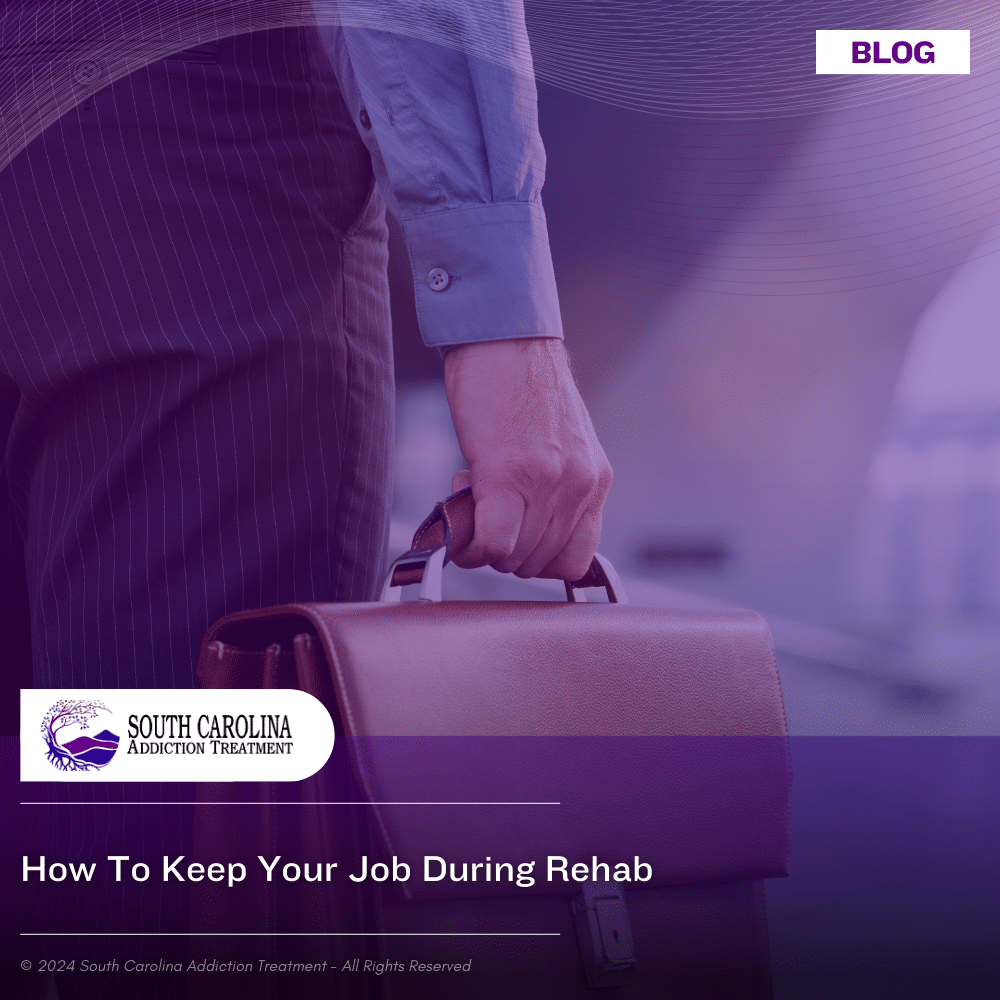How to Keep Your Job During Rehab

Medically Verified: 2/1/24
Medical Reviewer
Chief Editor

All of the information on this page has been reviewed and verified by a certified addiction professional.
When you think about someone living with drug and alcohol addiction, you may imagine someone who has hit “rock bottom” and is unable to function. But the truth is that most people with a substance use disorder are employed–about 70%. This means many who abuse drugs and alcohol are showing up for work each day.
Drug and alcohol addiction can cause serious harm to your mental and physical health. It can strain your relationships, limit your opportunities, and put you at risk for both short-term and long-term danger. With all the severe consequences of addiction, it’s easy to imagine that people living with the condition would always recognize the need for help and seek treatment.
But fewer than one in ten people with addiction get the help they need to overcome it. Why is this? People may worry about judgment or the stigma that surrounds addiction. Some may be in denial that they need professional treatment.
Many fear that they will lose their job if they take time away to go to rehab. But federal laws prevent you from being fired for seeking addiction treatment, and it’s possible to keep your job during rehab.
Keep reading to learn about the options you have and what steps you should take to keep your job during rehab. For more information or to discuss treatment options, reach out to the caring team at South Carolina Addiction Treatment today.
Is it Possible to Keep Your Job During Rehab?
No two people have the same experiences with addiction and recovery. People have different needs based on their substance use, health, environment, and other personal factors. Substance abuse treatment occurs in many settings and levels of care to meet different people’s needs.
Before starting treatment, a doctor or addiction specialist will evaluate your needs and recommend a level of care. The levels of addiction treatment include:
- Outpatient programs
- Intensive outpatient programs (IOPs)
- Partial hospitalization programs (PHPs or partial care)
- Inpatient or residential programs
In some cases, it may be possible for people in outpatient programs to continue to work. Treatment activities may occur several times a week in the morning or evening to accommodate people’s work schedules.
People requiring inpatient or residential treatment may be unable to work while receiving treatment, but they may stay in touch with their employer throughout treatment if they wish. Workers are protected by federal laws, which keep their job safe while they seek the help they need to recover.
What Laws Can Help Me Keep My Job During Rehab?
Federal laws prevent employers from firing workers during addiction treatment. These laws allow people to seek the treatment they need without fear of losing their employment.
The Family and Medical Leave Act (FMLA)
The Family and Medical Leave Act (FMLA) protects your employment for up to 12 weeks while you go to rehab. You must meet the criteria to be covered by FMLA, including:
- Your company must have at least 50 employees
- You must have been employed at the company for 12 consecutive months and must have worked at least 1250 hours before taking a leave of absence to attend substance abuse treatment
- You must attend a professional, evidence-based treatment program during your leave of absence
If you meet these criteria, FMLA will likely protect your employment while participating in addiction or mental health treatment.
Americans with Disabilities Act (ADA)
The Americans with Disabilities Act (ADA) prevents employers from firing or discriminating against employees with addiction. The ADA may allow you to adjust your work schedule to accommodate treatment-related activities, including 12-step meetings, drug testing, or medical appointments.
Health Insurance Portability and Accountability Act (HIPAA)
This law protects the privacy of your medical and mental health information and prohibits your employer from accessing your medical information without your consent.
Taking Steps to Keep My Job During Rehab
Talking to your employer about taking a leave of absence to go to rehab can seem challenging. But understanding your rights and what to do at each stage may empower you to take this step.
1. Get a diagnosis
Your doctor or medical practitioner must assess you and provide a formal diagnosis of a substance use disorder.
2. Find the right treatment program
You must find the program that meets your needs and offers the level of care you require. You can obtain referrals from addiction counselors, friends and family, insurance companies, or medical providers. You may also contact the staff at a treatment center directly to ask about your treatment options.
3. Inform Human Resources
Contact your human resources representative and inform them that you require a leave of absence to undergo addiction treatment.
4. Communicate
Communicate with your employer as best you can during treatment, but remain focused on your recovery. Tell your employer when you plan to return to work and inform them that you will be taking a leave of absence covered by FMLA.
Get Help Now
Comprehensive, effective addiction treatment is only a phone call away. Reach out to the caring staff at South Carolina Addiction Treatment to learn about your treatment options. Our admissions staff can give you the support and information you need to keep your job during rehab. Don’t wait another day for the help you deserve. Call today.

